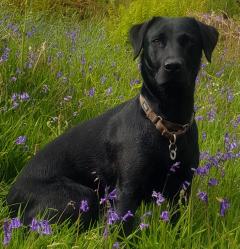Interventional laser surgery cures incontinence in young dog
Alternative to major surgery delivers immediate benefits.
Veterinary specialists from the Royal (Dick) School of Veterinary Studies’ Hospital for Small Animals have been able to cure a young dog with persistent urinary incontinence.
They successfully corrected a common birth defect using a laser guided by a small camera inserted into the dog's bladder.
The young dog recovered quickly from the novel procedure, which is an attractive alternative to the major abdominal surgery usually required to treat this condition.

Persistent incontinence
Perdi, a one-year-old female Labrador was referred by her vet to the Hospital for Small Animals due to her persistent urinary incontinence that had failed to respond to medical management.
Initial test results confirmed that a urinary tract infection or urinary stones were not the cause of her incontinence. Veterinary specialists from the Hospital’s Internal Medicine team, using a protocol designed by the Hospital’s Diagnostic Imaging team, performed an ultrasound and a 4D CT excretory urography to examine Perdi’s kidneys, ureters and bladder.
The procedures, which were performed whilst Perdi was under anaesthetic, confirmed that the young dog had an ectopic ureter. Fluoroscopy and cystoscopy were then used for the team to confidently confirm that Perdi had an intramural ectopic ureter.
Ectopic ureter
Perdi was born with this defect. Instead of her ureter leaving her kidney and terminating in her bladder, it tunnelled within the bladder and urethra wall and opened straight into her urethra, resulting in her having persistent urinary incontinence.
Ectopic ureters are the most common causes of congenital urinary incontinence in young female dogs. Unfortunately, as medical management of the condition had proved unsuccessful in Perdi’s case, she became a candidate for intervention.
Laser surgery
Keen to avoid major abdominal surgery, clinicians Dr Glynn Woods and Dr Marissa Ferreira performed a cystopic-guided laser ablation whilst Perdi was anaesthetised. This involved them inserting a special laser and tiny camera into Perdi’s bladder. The clinicians then used the laser, guided by the camera, to successfully re-locate Perdi’s ureter orifice into her bladder.
The procedure went ahead without any complications and Perdi quickly recovered from the anaesthetic. The young dog has given some pain relief and kept comfortable by the nursing staff before being discharged the following morning.
Successful outcome
Perdi’s incontinence resolved immediately after the procedure and her owners reported no incontinence in the weeks that followed. No urinary complications associated with the laser procedure were found at Perdi’s six-week post-operative check.
Perdi’s case is a great example of how a step wise medical approach. Application of advanced imaging techniques and minimally invasive interventions can make remarkable difference to both dog and owners' life. Perdi’s owners and local vet worked closely with our team to ensure that Perdi was the most suitable candidate for the procedure prior to embarking on the trip to Edinburgh. Marisa and I are over the moon that she has responded so well.
About the Royal (Dick) School of Veterinary Studies
The Royal (Dick) School of Veterinary Studies is a one-of-a-kind centre of excellence in clinical activity, teaching and research. Our purpose-built campus, set against the backdrop of the beautiful Pentland Hills Regional Park, is home to more than 800 staff and almost 1400 students, all of whom contribute to our exceptional community ethos.
The School comprises:
The Global Academy of Agriculture and Food Systems
The Hospital for Small Animals
The Jeanne Marchig International Centre for Animal Welfare Education
We represent the largest concentration of animal science-related expertise in Europe, impacting local, regional, national and international communities in terms of economic growth, the provision of clinical services and the advancement of scientific knowledge.


